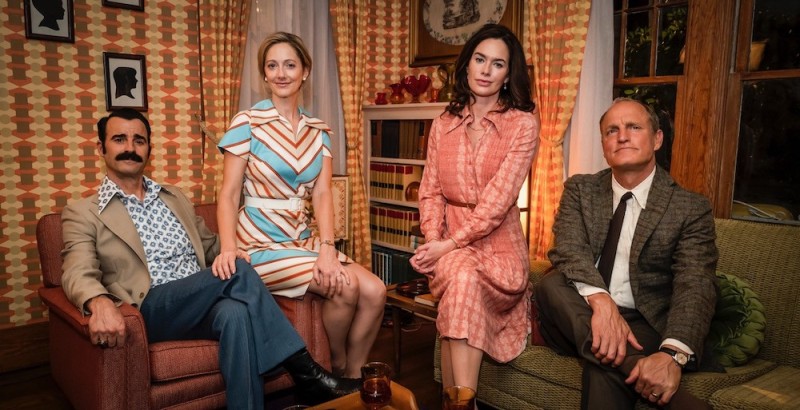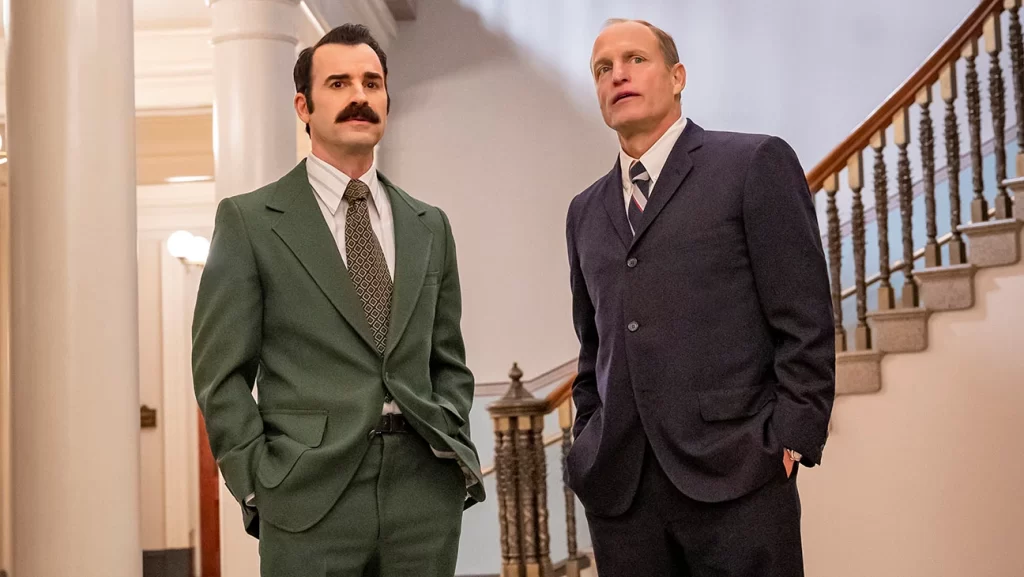
White House Plumbers review: A goofy, sharply satirical ride through Watergate scandal

In a scene from HBO’s White House Plumbers, currently streaming on Jio Cinema, G. Gordon Liddy (FBI agent convicted in the Watergate scandal), played with atypical cartoonish-ness by Justin Theroux, invites his friend and co-schemer in the botched burglaries at the Watergate complex in 1972, E. Howard Hunt (played by Woody Harrelson) to his home over dinner. Accompanied by his wife, Hunt is offered to listen to something. Audaciously and rather ludicrously, Liddy plays to the visiting couple a speech by Adolf Hitler.
It’s a scene that perfectly encapsulates the extremes within which this show operates. There are either the scatterbrain exaggerations that push the envelope against colossal miscalculations of taste or there are the genuinely sombre moments that jut out awkwardly from the wonky exterior of the film. Nothing, though, feels ordinary or boring at least.
A comedy of bureaucratic errors
How could it be? Watergate is as much a historic scandal as it has since become a cultural phenomenon. It has inspired spoofs, films, music albums, books and of course, shows. Based on the 2007 book Integrity by Egil Krogh (an official of the Richard Nixon administration imprisoned after the scandal) and Matthew Krogh, it spells out those heady days when the Nixon presidency attempted to cover up a failed burglary to break into the offices of the Democratic Party. What made this scandal unique as much as it ultimately also felt shambolic, was the paranoia and ineptitude that it represented, the comedy of bureaucratic errors that it eventually came to be recognised as.
Also read: Succession review: A cautionary tale on the state of democracy, and rich-poor divide
A five-part mini-series, White House Plumbers tells the story of how Liddy and Hunt accidentally sabotaged the Nixon presidency by failing to break into the Watergate hotel. This is a story of failing, by failing. The series begins with that iconic, giveaway event that we are immediately told was one of four attempted break-ins. “Maybe I don’t have the right tools”, one of the men trying to pick the lock says as both Hunt and Liddy sigh in exasperation. How could people so highly placed and so intimately recommended come with such a poor set of skills? That’s kind of the point of a story that illustrates just how farcical and frictional those months of paranoia led by the buffoonery of two sycophants was like.
Theatrics, goofiness and absurdity
Both Hunt and Liddy are operatic, hare-brained creatures, but within that limited subset they do echo a certain contrast. Harrelson’s Hunt is restrained, often switching between a mumbling bigot and a concerned husband and father. “I won’t have this Commie propaganda in my house,” he remarks at an issue of Time magazine with Daniel Ellsberg on the cover. Hunt’s wife, Dorothy, played with great pathos by Lena Headey (Game of Thrones star), is possibly the show’s only destination for sober contemplation. She squirms and recoils at the sound of Hitler’s voice playing on the record. Hunt, on the other hand, remains composed, bemused but also fascinated. His enigmatic self continues to be the show’s strength and weakness.

Theroux’s portrayal of Liddy is a bit off-putting. He doesn’t so much play the character as he caricaturizes his ticks and beliefs. Satire can often blur the boundary between the two — as Succession has so ably displayed of late — but here the theatrics are far too churlish to be allotted a vein of self-seriousness. The goofiness quite simply makes the show feel like a parody when it could have, at least, attempted to clutch at solemness of sorts.
Also read: Killers of the Flower Moon: Martin Scorsese’s intimate tale of racial reckoning in America
It’s why a major death in the latter episodes feels absurd, almost as if the show’s compass has gone awry for a split second, leaving people scampering for their axis of belief and denial. They simply do not land on one specific thing. In Succession, in comparison, a mammoth death was instead created with painstaking attention to emotional details and diagrams. Even of entitled bigots.
Punches of layered, textural beauty
But there are some generally funny moments in the show. Conversations between Hunt and Liddy often devolve into frightening confessions about their ideas. There isn’t a lot of actual character insight, but as is common to satire, it’s the scathing witlessness of it all that takes your breath away at times.
Harrelson, despite his torn self here, is magnetic and watchable. The supporting cast which also features Cuban fixers, a crooked but polite White House Attorney and other eccentric handymen, are all interesting, at times gleefully satisfying add-ons to the main story. Even CIA agents, aghast at the silliness of it all, come across as the perfect foil for the dogged determination of two men who think they can do no wrong.
The show, created by the people behind the hit HBO satire Veep (created and written by Alex Gregory and Peter Huyck, it is directed by David Mandel), carries similar snarl and obviously parodies a past to kind of fit a comment on the present — at one point it even suggests a wild theory about JFK. At another point, Liddy overtly declares “F**ck JFK” as a group motto as opposed to something he actually believes in. Which is where the show often fumbles. It’s clear about portraying the two as raging buffoons, and yet it doesn’t quite know where to draw the line between constructive madness and destructive excess.
Also read: ‘Air’ review: Ben Affleck soars as a director in affecting Nike sports drama
That said, White House Plumbers is also a series that refuses to simply die. Every time you think it has run out of spunk to spray or spilled a cuss word far too many, it returns with a gut punch of layered, textural beauty. It’s probably what happens when good writers, with a credible history of work, do something with the intention of exacting a comment rather than enacting a moment. They forget who they are as creators, and leave us with an impression of who they are as politicians.
On Succession and Veep, the same satire operates in grey areas, offering even the inane, the unlovable, the olive branch of a kind of humanity. Here, they end up becoming distortions as opposed to tangible characters. Funny, because they are horrible at what they do, but without the numbing consideration for an alternative world where, had they been good, things might have been different. It’s no less fun, however, to have a chuckle at their expense.

